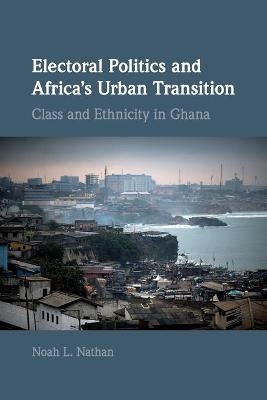
Electoral Politics and Africa's Urban Transition
Class and Ethnicity in Ghana
Seiten
2020
Cambridge University Press (Verlag)
978-1-108-46818-3 (ISBN)
Cambridge University Press (Verlag)
978-1-108-46818-3 (ISBN)
Despite the rapid urbanization of African societies, the socio-economic changes associated with urbanization are not having the political effects that many expected. This book contributes to understanding African urbanization, political behavior, and the ability of developing societies to transition away from clientelism.
Two aspects of contemporary urban life in Africa are often described as sources of political change: the emergence of a large urban middle class and high levels of ethnic diversity and inter-ethnic social contact. Many expected that these factors would help spark a transition away from ethnic competition and clientelism toward more programmatic elections. Focusing on urban Ghana, this book shows that the growing middle class and high levels of ethnic diversity are not having the anticipated political effects. Instead, urban Ghana is stuck in a trap: clientelism and ethnic voting persist in many urban neighborhoods despite changes to the socio-economic characteristics and policy preferences of voters. Through a unique examination of intra-urban variation in patterns of electoral competition, Nathan explains why this trap exists, demonstrates its effects on political behavior, and explores how new democracies like Ghana can move past it.
Two aspects of contemporary urban life in Africa are often described as sources of political change: the emergence of a large urban middle class and high levels of ethnic diversity and inter-ethnic social contact. Many expected that these factors would help spark a transition away from ethnic competition and clientelism toward more programmatic elections. Focusing on urban Ghana, this book shows that the growing middle class and high levels of ethnic diversity are not having the anticipated political effects. Instead, urban Ghana is stuck in a trap: clientelism and ethnic voting persist in many urban neighborhoods despite changes to the socio-economic characteristics and policy preferences of voters. Through a unique examination of intra-urban variation in patterns of electoral competition, Nathan explains why this trap exists, demonstrates its effects on political behavior, and explores how new democracies like Ghana can move past it.
Noah L. Nathan is Assistant Professor of Political Science at the University of Michigan, Ann Arbor. He has conducted extended field research on electoral politics in Africa, especially in Ghana.
Part I. Introduction: 1. Urban politics in a trap; 2. Urban Ghana in context; Part II. The Middle Class and Programmatic Politics: 3. Class and preferences; 4. Credibility, patronage, and participation; Part III. Neighborhoods and Ethnic Competition: 5. Ethnic competition across neighborhoods; 6. Distributive politics in urban areas; 7. Neighborhood context, expectations of favoritism, and voting; Part IV. Implications for Urban Governance; 8. Turnout inequality and capture in municipal elections; 9. Paths out of the trap?; Bibliography; Index.
| Erscheinungsdatum | 21.05.2020 |
|---|---|
| Reihe/Serie | Cambridge Studies in Comparative Politics |
| Zusatzinfo | Worked examples or Exercises; 25 Line drawings, black and white |
| Verlagsort | Cambridge |
| Sprache | englisch |
| Maße | 230 x 150 mm |
| Gewicht | 560 g |
| Themenwelt | Sozialwissenschaften ► Politik / Verwaltung ► Politische Systeme |
| Sozialwissenschaften ► Politik / Verwaltung ► Staat / Verwaltung | |
| Sozialwissenschaften ► Soziologie ► Empirische Sozialforschung | |
| Wirtschaft ► Volkswirtschaftslehre ► Wirtschaftspolitik | |
| ISBN-10 | 1-108-46818-7 / 1108468187 |
| ISBN-13 | 978-1-108-46818-3 / 9781108468183 |
| Zustand | Neuware |
| Informationen gemäß Produktsicherheitsverordnung (GPSR) | |
| Haben Sie eine Frage zum Produkt? |
Mehr entdecken
aus dem Bereich
aus dem Bereich
wie ich versuchte, Italienerin zu werden
Buch | Hardcover (2024)
Droemer (Verlag)
CHF 35,90


